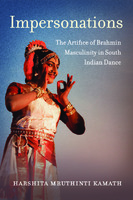Impersonations
The Artifice of Brahmin Masculinity in South Indian Dance
Author(s)
Mruthinti Kamath, Harshita
Language
EnglishAbstract
Drawing on multisited ethnographic fieldwork and performance analysis, this book centers on an insular community of Smarta brahmin men from the Kuchipudi village in Telugu-speaking South India, who are required to don strī-vēṣam (woman’s guise) and impersonate female characters from Hindu religious narratives. According to the hagiography of Siddhendra, the founding saint of Kuchipudi dance, every brahmin man from a hereditary Kuchipudi family must don strī-vēṣam at least once in his life, a prescription that still resonates in the village today. Impersonation, the term used to indicate the donning of gender guise (vēṣam), is not simply a performative mandate for Kuchipudi brahmin men but also a practice of power that creates normative ideals of brahmin masculinity in village performance and everyday life. However, the construction of brahmin masculinity against the backdrop of impersonation is highly contingent, particularly on account of the expansion of Kuchipudi in the latter half of the twentieth century from a localized village performance to a transnational Indian “classical” dance tradition. By shifting from village to urban and transnational spaces, the book traces the technologies of normativity that create, sustain, and undermine normative ideals of gender, caste, and sexuality through the embodied practice of impersonation in contemporary South India.
Keywords
impersonation; Kuchipudi; brahmin masculinity; Telugu; South India; Indian dance; strī-vēṣam; woman’s guise; gender; casteDOI
10.1525/luminos.72ISBN
9780520301665OCN
1135849579Publisher
University of California PressPublisher website
https://www.ucpress.edu/Publication date and place
Oakland, 2019Classification
Asian history
Religion: general
Anthropology


 Download
Download Web Shop
Web Shop